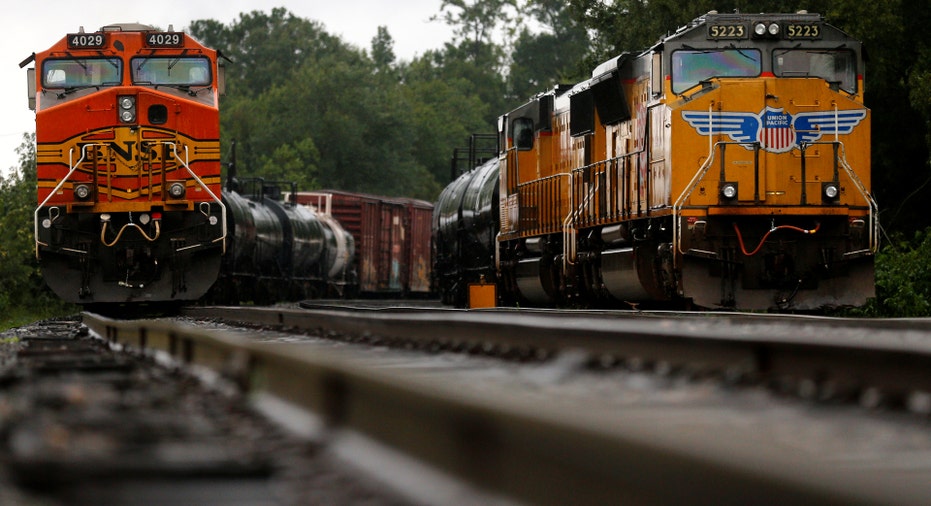Harvey may cause long-term disruption on Houston's rail tracks

(Reuters) - Major U.S. railroads have warned that it could be a long time before normal operations resume in the Houston area where Tropical Storm Harvey has caused catastrophic flooding.
Closure of rail lines in the grain transport hub and nexus for cross-border traffic with Mexico presents a costly headache for customers ranging from automakers to farmers who use the lines to send ethanol, cereals and auto parts to and from Mexico or to be loaded onto ships.
Union Pacific Corp and Berkshire Hathaway Inc's BNSF Railway, the two leading U.S. railroads, and regional railroad Kansas City Southern have suspended operations in the area affected by the storm.
"We don't have a historical precedent with this one," said Thomas Williamson, owner of Florida-based rail broker Transportation Consultants Co. "I expect service to be disrupted anywhere from two to six weeks."
Union Pacific, the No. 1 U.S. railroad, said that as of midday on Wednesday, sections of track were out of service in 18 of its 28 Houston-area subdivisions, and it was sending traffic along alternate routes through Longview and Dallas.
The railroad said it was using helicopters and drones to inspect track and facilities in areas without road access. And it said workers were reorganizing major rail yards at Settegast, near downtown Houston, and Englewood, including assessing infrastructure, getting trains reassembled and cars back in the yard.
A Midwest-based conductor at the railroad said parts of Union Pacific's Englewood Yard were flooded as of late Tuesday.
The company, which has been rerouting rail traffic away from Houston, said traffic entering or leaving through the north and east sides of Houston was on hold, and its main line between Houston and San Antonio, to the west, was out of service.
BNSF said in a Tuesday customer announcement that normal train flows in the area were unlikely to resume for "an extended period."
A spokesman at CSX Corp, the No. 3 U.S. railroad, which has so far been unaffected by Harvey, said on Wednesday it was "closely watching the weather conditions in Louisiana and the southwestern portion of our operating network."
COSTS UNKNOWN
Loadings of wheat, corn and sorghum onto ships for export have been halted in Texas. And although coastal grain elevators have not been significantly damaged they have been unable to receive supplies.
Archer Daniels Midland Co's grain elevators remained operational in Corpus Christi and Galveston, Texas, but loadings there cannot resume until rail transportation begins again, a spokeswoman said.
Louis Dreyfus Co, [AKIRAU.UL] which has grain terminals in Beaumont and Houston, did not return requests for comment on Wednesday.
Kansas City Southern, with much of its business focused on U.S.-Mexico trade, may have greater exposure to disruption caused by the storm than the other two railroads, Cowen & Co analyst Jason Seidl said in a note to clients.
Kansas City Southern said on Wednesday its lane between Houston and Laredo on the U.S.-Mexico border remained closed, but it said its infrastructure so far had not been significantly damaged.
"We continue to monitor the situation, which has expanded and is now impacting new areas on our system, namely Beaumont, Texas, and Lake Charles, Louisiana," Kansas City Southern said in a written statement.
Rail customers and their transportation providers will find ways to bypass Houston, said Rick Ehrensaft, chief operating officer at Grand Worldwide Logistics Corp, a warehouse and third-party logistics company with locations across the United States.
"There will be some triaging using other modes of transportation to get around anything that's been routed through there," he said. "What that's going to do to costs is unknown."
Once the rails are up and running, railroad operators will likely benefit as goods for recovery and rebuilding are sent to the region, said independent railroad analyst Anthony Hatch.
"We can be sure that the rails will be quicker to recover than most as they have been through this before," he said.
Hurricane Katrina in 2005 damaged about 200 miles (320 km) of CSX track on the Gulf Coast, causing about $250 million in damages, 90 percent of which was covered by insurance.
(Reporting by Nick Carey in Detroit and Eric M. Johnson in Seattle; Additional reporting by Jarrett Renshaw in New York and Michael Hirtzer and Karl Plume in Chicago; Editing by Peter Cooney, Toni Reinhold)



















